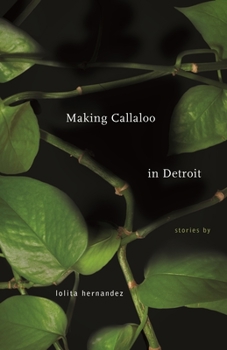Making Callaloo in Detroit
Stories of hope and quirky survival in the city of Detroit colored by Caribbean culture and memory.
The daughter of parents from Trinidad and Tobago and St. Vincent, Lolita Hernandez gained a unique perspective on growing up in Detroit. In Making Callaloo in Detroit she weaves her memories of food, language, music, and family into twelve stories of outsiders looking at a strange world, wondering how to fit in, and making it through in their own way. The linguistic rhythms and phrases of her childhood bring distinctive characters to life: mothers, sons, daughters, friends, and neighbors who crave sun and saltwater and would rather dance on a bare wood floor than give in to despair. In their kitchens, they make callaloo, bakes, buljol, sanchocho, and pelau--foods not usually associated with Detroit.
Hernandez's characters sing and dance, curse and love, and cook and eat. A niece races to make a favorite family dish correctly for an uncle in the hospital, three friends watch an unfamiliar and official-looking man in the neighborhood, lovers and daughters cope with sudden deaths of the men in their lives, a man who can no longer speak escapes his life in imagination, and families gather to celebrate the new year with joyful dancing against a backdrop of calypso music. Hernandez's stories reflect the diversity of characters to be found at the intersection between cultures while also offering a window into a very particular and rich Caribbean culture that survives in the deepest recesses of Detroit.
In addition to being a compelling and colorful read, Making Callaloo in Detroit explores questions of how we assimilate and retain identity, how families evolve as generations pass, how memory guides the present, and how the spirit world stays close to the living. All readers of fiction will enjoy this lush collection.





